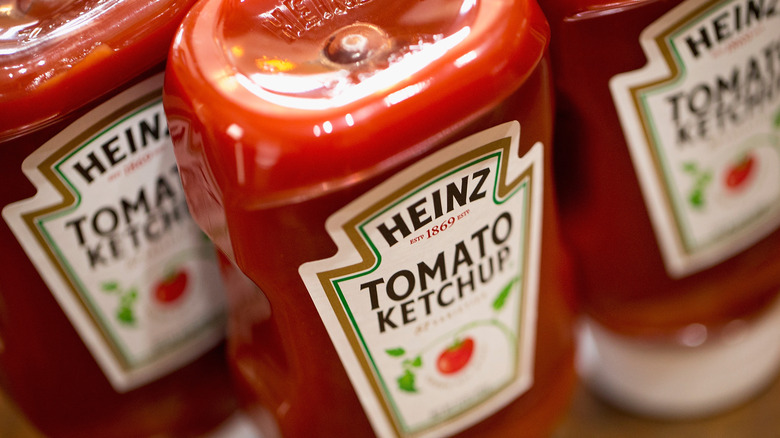Heinz Has Officially Decided Whether Or Not Ketchup Belongs In The Fridge
Heinz has recently settled a contentious debate about where to store a popular condiment. The company behind one of the most popular ketchup products tweeted its verdict on June 27: "FYI: Ketchup. goes. in. the. fridge!!!"
The tweet quickly went viral, being viewed roughly 4.8 million times, and also led to agreements as well as disapproval in the comments. Many people voiced their strong aversion to storing ketchup in the fridge by pointing out that the condiment is not found in the refrigerated section at grocery stores. "Heinz don't even know where their product should be stored," one user replied. "of course it does. after opening," another user tweeted. "is this controversial?"
The next day, the official Heinz U.K. Twitter account tweeted a poll letting its followers settle the debate. Though restaurants don't typically keep ketchup in the fridge, most households do. With over 13,000 votes cast, most people sided with Heinz; 63.2% believe ketchup should be kept in the refrigerator. 36.8% of pollsters say ketchup belongs in the cupboard.
Heinz has long said ketchup belongs in the fridge
Unsurprisingly, Heinz took a side in this ketchup storage debate. The company has long firmly stated that its ketchup should be stored in the fridge after opening, and this isn't the only time it has publicly declared its encouragement to do so on social media. In 2017, the company replied to a tweet pondering the same question, stating that while its product is shelf-stable due to its natural acidity, consumers should still "refrigerate after opening to maintain product quality." It's not just ketchup Heinz advises to refrigerate after opening. Other condiments, including mustard, should be stored in the fridge after opening.
Where do you keep yours? It has to be... in the fridge!
— Heinz (@HeinzUK) June 28, 2023
Those who are staunch supporters of keeping ketchup in their pantries do have science to back them up. According to ScienceDirect, ketchup contains tomatoes and vinegar, acidic ingredients that help with self-preservation. But whether you like or despise cold ketchup, to ensure its safety to eat, it looks like ketchup should be kept in the fridge.

